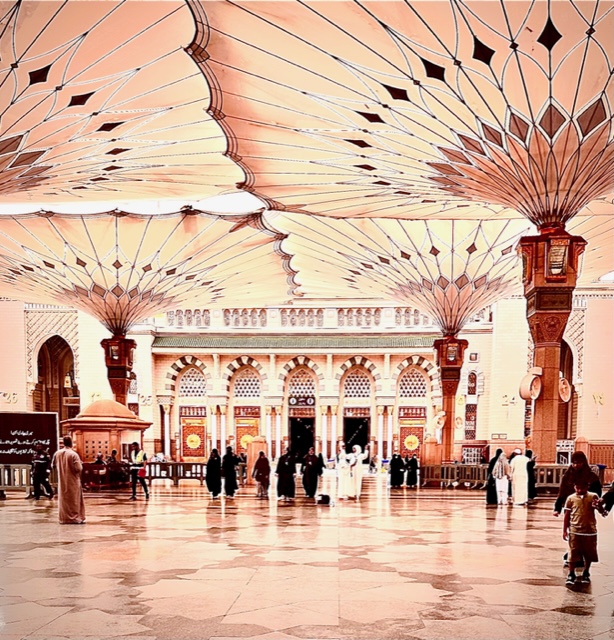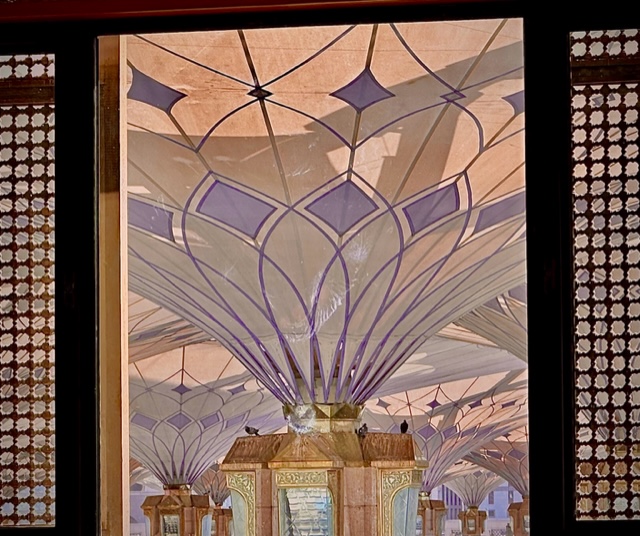Had an interesting experience the other morning at the Prophet’s Mosque. It was early morning, the weather has turned blessedly cool, it was cloudy. Perfect weather conditions to observe the comings and goings at Gate 24. I was sitting on a provided fold up stool. A woman with a wheel chair near her was laying on the carpet. Men, charged with the responsibility of cleaning told the women that the carpets would be removed so they could clean. I leaned over
Me: Could I help you get up?
She: I help you?
Me: Oh no. I want to help you.
Our conversation began. She, in halting English told me that she was from the Sudan. I commiserated, saying I knew of the conditions in Sudan.
Commiserate is to express or feel sympathy or pity; sympathize. The synonyms are kind: be sympathetic to, express sympathy for, condole with, empathize with, feel pity for, feel sorry for, feel for, be moved by, comfort, console, solace, give solace to; one’s heart goes to.
She inquired about me. I told her that I was born in Canada, had been a Muslim for only three years, that I spoke only English. Was planning to learn Arabic to speak to people on a basic level.
She: You have to read the Quran in Arabic. I will not understand in English.
Me: No. There are excellent English translations by scholars. It would take me too long to learn Arabic.
She: No, you must read it in Arabic.
Me: No. I know Arabic is the best. But if I read many English translations, which I do.
She: No you have to read it in Arabic.
Me: I can also read other messages from English speaking scholars.
She: No. You have to read it in Arabic.
I realized that she and I were never going to reach agreement. I was beginning to feel angry. I stood, folded up the stool, put it on the rack saying (as I recall).
Me: I cannot listen to you anymore. I will practice my faith in my own way.
I then walked back to my nearby hotel faintly hearing her repeat me name. I had given her a blog card so she knew my name.
This is most instructive. FAME provided an invaluable website. It is Islamland.com أرض الإسلام. (Explore Islam In 140 Language). One of the largest Islamic websites that introduce Islam in over than 140 languages. I had begun to read some of the collected papers, finding them clear, exceptional well written, imparting wisdom. After this encounter I returned to the Oberio to pursue knowledge and enlightenment. One paper was called The System of Life in Islam quote from it.
“There are three basic systems that claim to organise the affairs of mankind. You find that in one of them the state takes ownership of all facilities for production, tries to own everything under the premise of true equality between the people. All humans are equal, and therefore all humans should have the same material needs, and same material desires. There is a second system of life that seems to behave in completely the opposite way. It claims that the means to create wealth are owned by individuals, and the individual has as much right to sell his or her labour at what ever rate he wishes to. What you find in this system is the rich seem to continuously become richer, while the poor seem to stay in a continual state of poverty because of the underlying rhetoric of ‘every man for himself.’
One of the major problems with these two systems is that they divide away the relationship between the world and the creator of the world. In the first model, known commonly as Communism, the role of God is not mentioned. Karl Marx, the author of the communist manifesto, was adamantly anti religion. All governments that have attempted to follow his ideas have also sought to control or eliminate religion. Within the second system mentioned above, commonly known as Capitalism, God again takes a back seat. Capitalist states are known to be secular, i.e. having a division of state and belief; one is allowed to believe what he likes as long as it does not effect the daily working of society.
There is a system that not only acknowledges the creator, but ensures that the rules and regulations of every aspect of man’s affairs are organised. Who would best know how to fix a broken car, the very designer of that car, or a man who came along and simply pulled at one nut or another hoping to fix it?
Surely the designer of the whole of mankind is in the best place to solve the issues of the very life he created. This system is known as a deen, with every aspect of life an act of worship; so when a man goes out to work he is allowed freedom to own his possessions, has freedom to gain wealth and prosper, but at the same time he is not allowed to cheat in the market place, exploit those who needs his goods and must give in charity to those who are poorer than he, thus giving a balance. When he takes people to work with him, he must treat them fairly, and pay them their salaries “before their sweat dries…”
“Seek the abode of the Hereafter in that which God has given you, and neglect not your portion of the world, and be kind as God has been kind to you and seek not corruption in the earth…”
Other systems are organised too, in fact every system is organised by the creator. Apart from systems to organise the economy, we can see systems to provide for the whole of society in a manner that looks after the needs of civilisation as a whole, therefore for a greater reason, the needs of the individual are looked after too. As examples we can see that the systems for health care are manifest, we can see the organisation of the judicial system, the political system, the manner in which to manage the environment, how to organise the social structure, and how to manage affairs between countries; the list continues. Ultimately, this system is not man-made, so therefore if followed perfectly will allow for a harmonious land to exist.”
There was also another paper. Most instructive, timely and helpful, as you shall see. I am providing the link to the entire article, quoting portions, including some personal experiences, First, from the article:, following a discussion on the harmful effects of anger.
The Islamic Remedy For Anger.
The paper begins speaking of anger, its harmful effects in the family, society and the world in general. There is an answer as the author points out by quoting the Quran and then providing insight of her own.
The Almighty has given us a great remedy for hell fire! Yes, it is the Holy Quran. It prescribes the medicine for this devastating malady. It gives the strength to overcome and suppress anger. The Holy Quran says, And if an evil suggestion comes to you from Shaytaan, then seek refuge in Allah, He is hearing and knowing. [Quran, 7:200]
6 Ways to Deal With Anger
- To reduce your anger, perform wudu, which cools you rapidly and brings down your temper.
- When you are angry or when you come across an agitated person, at once say,I seek refuge in Allah from the Shaitaan, the forbidden.
- Avert your attention from the cause of your anger and involve yourself in vigourous physical activities so that your mind and your body can relax
- .Forgive the wrongs done to you. Why? Because for all the sins we do, Allah forgives us and suppresses His anger. This is stated in the Holy Quran: . . . and He pardons much. [Quran, 42:30]
- If you find your anger escalating, stop and remind yourself that if you don’t control your anger now, unhealthy circumstances like divorce, loss, and lifelong enmity are just around the corner.
- Don’t move until your anger is suppressed.
The article ends on this note: When you’re happy, don’t make promises; when you’re angry, don’t make decisions. And don’t forget this: Anything and everything is watched by Allah Subuhana watala.
First the link and then my observations based, in part upon the incident at the Prophet’s Mosque and my experience with the bedlam of the children at the Oberio Hotel of a very days ago. The link: http://www.islamland.com/eng/articles/the-remedy-for-anger
I do disagree with “Don’t move until your anger is suppressed” In both situations I did move. I got away from the bedlam, retreating to the haven of my room, staying there all day and the next morning until the Turkish Turkey Group had departed. But in the meantime, ‘Son’ provided a respite. The secluded table in the restaurant, with the view of the Prophet’s Mosque, ear phones, staff members with their sympathy. My anger disappeared, replaced by gratitude.
Escaping the Sudanese woman by going back to the haven of the Oberio and my room also brought gratitude. I was able to spend time reading and writing about Anger.
I would also disagree with the article for the following reason. At my age the idea of ‘vigorous physical activities’ is not a possibly. But that is just me.
Yesterday I used anger control in an entirely different way which brought relief and hope for the future. Lunch time found me and Muhammed (not the Prophet (PBUH) at Chuck E. Cheese. A photograph of the brochure announcing birthday celebrations will be included. MNTP filed me outside of the Fun Room. I think I will post it on FaceBook but speak of that decision and my anger control at a latter time.
One photograph shows where the Sudanese Woman Encounter took place. The other the view from the Kyoto Restaurant at the table I found solace.


